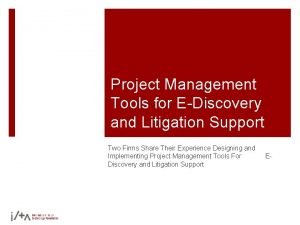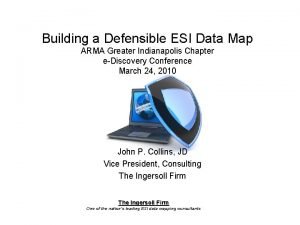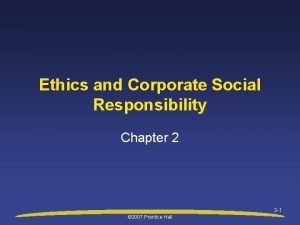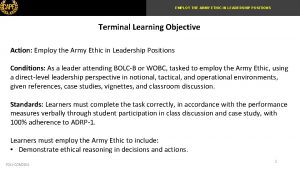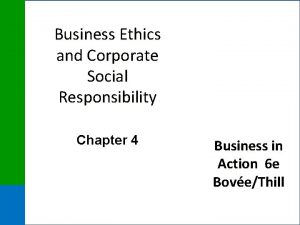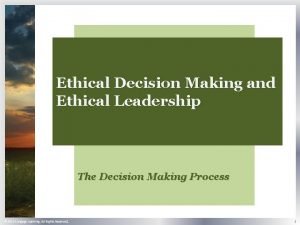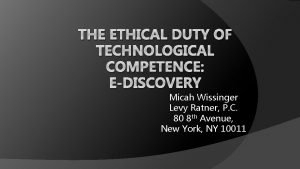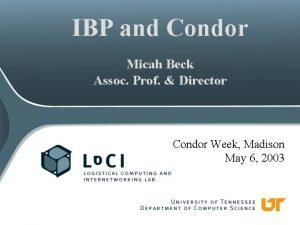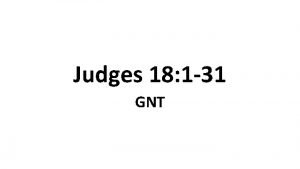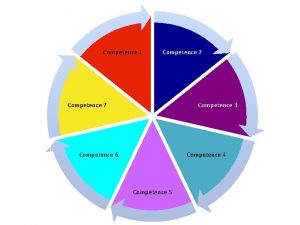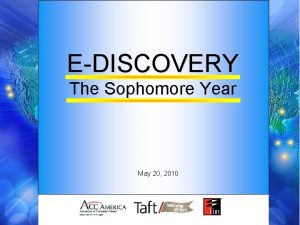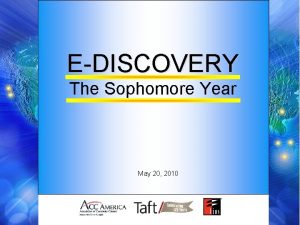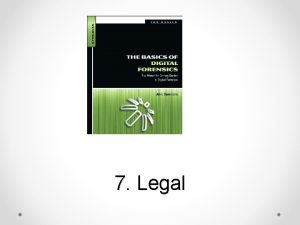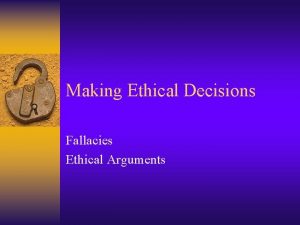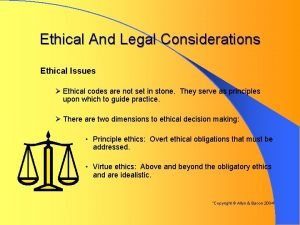THE ETHICAL DUTY OF TECHNOLOGICAL COMPETENCE EDISCOVERY Micah


















- Slides: 18

THE ETHICAL DUTY OF TECHNOLOGICAL COMPETENCE: E-DISCOVERY Micah Wissinger Levy Ratner, P. C. 80 8 th Avenue, New York, NY 10011

ABA Model Rule 1. 1 The Duty of Competence Rule 1. 1 __ Competence A lawyer shall provide competent representation to a client. Competent representation requires the legal knowledge, skill, thoroughness and preparation reasonably necessary for the representation. Comment 8 __ Maintaining Competence To maintain the requisite knowledge and skill, a lawyer should keep abreast of changes in the law and its practice, including the benefits and risks associated with relevant technology, engage in continuing study and education and comply with all continuing legal

ABA Model Rule 5. 1 and 5. 3 The Duty to Provide Appropriate Supervision Attorneys must appropriately supervise lawyers and nonlawyers under their supervision/control to ensure adherence to the Rules of Professional Conduct or, at a minimum, conduct consistent with the lawyer’s professional obligations.

California Ethics Opinion 2015 -193 An attorney undertaking representation must be able to directly perform the following nine tasks, or partner with competent co_counsel or expert consultants: 1. Initially assess e_discovery needs and issues, if any; 2. Implement/cause to implement appropriate ESI preservation procedures; 3. Analyze and understand a client’s ESI systems and storage; 4. Advise the client on options for collection and preservation of ESI; 5. Identify custodians of potentially relevant ESI; 6. Engage in competent and meaningful meet/confer concerning an e_discovery plan; 7. Perform data searches; 8. Collect responsive ESI in a manner that preserves the

The California Standing Committee advises that an attorney lacking these capabilities has three options: (1) acquire sufficient learning and skill before performance is required; (2) associate with or consult technical consultants or competent counsel; or (3) decline the client representation. California Ethics Opinion 2015 -193 at 3 -4.

e_Discovery The tasks associated with e_Discovery are distilled into the same components of traditional static discovery_ � Identification of Potential Sources of Information � Preservation/Collection � Document Review � Production � Supervision

The Sedona Principles_ � 14 principles considered to be a reasonable and balanced approach to the treatment of electronic data. � The most often used resource for handling e_Discovery, featuring prominently in e_Discovery cases and often used as a guideline during the meetand-confer process. � Every attorney should have a working understanding of The Sedona Principles.


� The Sedona Conference® has a collection of invaluable resources, including commentaries on federal rules of discovery, proportionality in e_Discovery, legal holds, email management and archiving, search and retrieval methods, preservation of “not reasonably accessible” ESI, ethics & metadata, discovery of ESI held by non-parties, achieving quality in the e_Discovery process and ESI evidence and admissibility. � All publications of The Sedona Conference® Working Group Series are available free for

Meeting your e_Discovery Obligation �Preserving Relevant and Proportional ESI �Defining the Data Set �Searching for Responsiveness Attorneys who are unable to understand basic concepts, tools and methodologies for preserving, searching, reviewing and producing documents may be unable to satisfy their client’s discovery obligations

Preservation_ � Rule 37(e) provides a roadmap to conduct e_Discovery in a proportional manner as set forth in the overall context of discovery per Rules 26. � The threshold inquiry is one of reasonableness. The committee notes expressly caution courts to be sensitive to the resources of the party losing ESI as some parties may have limited staff and resources to devote to preservation efforts. � Proportionality concerns for Union/Plaintiff counsel: text messages, social media posts and cell phone pictures/videos. � The obligation to preserve ESI in cases before the NLRB

Practical Tips to Achieve Proportionality in Preserving ESI_ � Make a written preservation plan, outlining a reasonable approach to ensure that relevant ESI will be available if requested. � Immediately learn and understand your client’s document management system. � Engage with document custodians as early as possible to know what exists and the steps you need to take to preserve the data. � Raise proportionality issues with opposing counsel early. Identify them before the first scheduling conference to present a reasonable preservation plan and get assistance from the court. � Distinguish material from marginal issues as early as possible. � Proportionality is not always dictated by the monetary value of the case, which is especially true in matters involving public policy. Tips adapted from Keeping Things in Proportion: Perseveration of ESI Under Amended Rule 37(e) , ABA Litigation Section, Karen Henry

Defining Your Data Set for Search and Review � Keyword Searching �Get input from document custodians about word usage. �Understand the likely output of your word choices. �Discuss with opposing counsel. � TAR _ “Technology Assisted Review” �Uses predicative coding and sampling methodologies to predict the frequency of

Document Review_ � Searches of data sets must be executed with a defensible rationale. � Searching must be performed by competent attorneys. � The capabilities of various software programs should be understood. � Not all search methods and tools are appropriate for all data sets.

Metadata_ � The possibility of inadvertent disclosure of sensitive information has always been part of the discovery process. But metadata presents an added concern for attorneys to maintain confidentiality over their own work product, attorney/client communications and the client’s confidential information. � The professional responsibility committees of several bar associations have provided guidance on an attorney’s ethical responsibilities regarding metadata, with varying results. Visit the

Claw Back Provisions__Protective Orders_Rule of Evid 502(d) � Parties may agree as part of their discovery planning to outline their ethical obligations with respect to inadvertently produced ESI. See Federal Rules 26(f) and 16(b)(3)(B)(iv). � Prior to enactment of the amendment to Federal Rule 26(b)(5)(B)__the “claw back” provision__there was nothing requiring an attorney to return inadvertently produced documents or metadata. There is now a specific provision and a body of law for resolving such claims.

Outsourcing__Supervision � An attorney maintains an ethical duty to supervise other attorneys and non_lawyers to ensure that their work product is in accordance with the law and contributes to the lawyer’s competent representation of the client. � Every attorney must become familiar enough with the technology used to process their ESI so as to have an understanding of the work being performed by junior attorneys and vendors.

The customary ethical rules related to discovery still apply to the handling of ESI__ � Accidently withheld documents must be turned over promptly upon discovery. And the attorney should explore the reason(s) why the documents were not initially discovered to guarantee that no other documents have been overlooked. � An attorney should resign as counsel if a client refuses to permit an attorney to fulfill his/her responsibilities in conducting e_Discovery. � Counsel should never assist a client in making false statements about the completeness of a document production. � An attorney should not obstruct the discovery process.
 Ethical competence
Ethical competence Ethical competence
Ethical competence Litigation project management
Litigation project management Europe healthcare archiving and ediscovery market outlook
Europe healthcare archiving and ediscovery market outlook Bexar county ediscovery
Bexar county ediscovery Ediscovery unindexed items
Ediscovery unindexed items Ediscovery data map
Ediscovery data map Perbedaan ethical dilemma dan ethical lapse
Perbedaan ethical dilemma dan ethical lapse Ethical lens of the ethical reasoning model
Ethical lens of the ethical reasoning model Chapter 4 ethics and social responsibility
Chapter 4 ethics and social responsibility The perceived relevance or importance of an ethical issue
The perceived relevance or importance of an ethical issue Micah williamson
Micah williamson Vmware workstation 16 gpu passthrough
Vmware workstation 16 gpu passthrough Micah
Micah Micah 6 8 the message
Micah 6 8 the message Micah wissinger
Micah wissinger Micah beck utk
Micah beck utk Micah's idol
Micah's idol John 11 48
John 11 48


